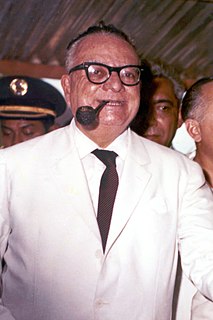
Rómulo Ernesto Betancourt Bello, known as "The Father of Venezuelan Democracy", was the 47th and 54th President of Venezuela, serving from 1945 to 1948 and again from 1959 to 1964, as well as leader of Acción Democrática, Venezuela's dominant political party in the 20th century.

The Communist Party of Argentina is a communist party in Argentina. It was founded on January 6, 1918 initially with the name International Socialist Party after the break with the Socialist Party and in adherence to the Revolution of October and the Third Leninist International.
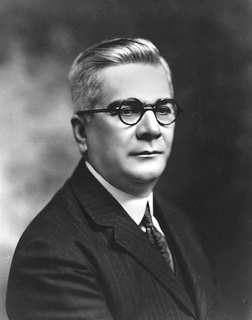
Gerardo Machado y Morales was a general of the Cuban War of Independence and President of Cuba from 1925 to 1933.

Foro de São Paulo (FSP), also known as the São Paulo Forum, is a conference of leftist political parties and other organizations from Latin America and the Caribbean. It was launched by the Workers' Party of Brazil in 1990 in the city of São Paulo.

The National Assembly of the Socialist Left was an alliance of far-left groups in Mexico. The only assembly of the socialist left for the creation of a "Socialist Front" was held in Mexico City April 16–17, 2005. The appeal inviting to the meeting was signed by:

Miguel Otero Silva, was a Venezuelan writer, journalist, humorist and politician. A figure of great relevance in Venezuelan literature, his literary and journalistic works related strictly to the socio-political history of Venezuela. Throughout his life he was repeatedly forced into exile. Later on, after the establishment of a democratic state in 1958, he was elected to the Venezuelan Senate.
In the context of Mexican politics, a national political association is a citizens' association intended to assist in the development of democratic life and the country's political culture, as well as being intended to create a better informed public opinion. They are similar to political parties; they used to receive public funding through the Federal Electoral Institute (IFE) for the promotion of their activities and ideas, but this was no longer the case after the 2008 political reform; after the 2014 political reform and the transformation of the IFE into INE, only political parties and independent candidates can receive public funding. APNs are not allowed to register candidates for election, though they can publicly support those of other political parties through association agreements and may only do so during federal elections. The creation of an APN is regarded as the first step towards the creation of a full-fledged political party.
The Cuban Revolution was the overthrow of Fulgencio Batista's regime by the 26th of July Movement and the establishment of a new Cuban government led by Fidel Castro in 1959.

The United Socialist Party of Venezuela is a socialist political party in Venezuela which resulted from the fusion of some of the political and social forces that support the Bolivarian Revolution led by President Hugo Chávez.

Carlos Manuel de Céspedes y Quesada was a Cuban writer, politician, diplomat, and President of Cuba.
José Ramón Machado Ventura, M.D. is a Cuban revolutionary and politician who was the First Vice President of the Council of State of Cuba from 2008 to 2013. With the election of Raúl Castro as President of Cuba on 24 February 2008, Machado was elected to succeed him as First Vice President. He has been Second Secretary of the Communist Party of Cuba since 2011.
Confederación Sindical Latinoamericana was a Latin American revolutionary trade union confederation 1929–1936, being the Latin American branch of the Red International of Labour Unions. The affiliates of CSLA led significant labour struggles during the period 1935–1936.
The First Conference of the Communist Parties of Latin America was in Buenos Aires, Argentina, June 1–12, 1929. Thirty-eight delegates, representing Argentina, Brazil, Bolivia, El Salvador, Guatemala, Cuba, Colombia, Ecuador, Mexico, Panama, Paraguay, Peru, Uruguay, and Venezuela, took part in the meeting. The only established communist party in the region that did not participate was the Communist Party of Chile, which at time suffered a period of harsh repression under the government of Carlos Ibáñez del Campo.
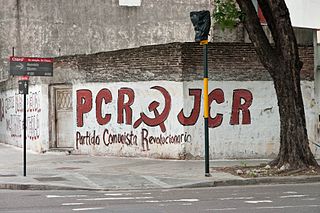
The Revolutionary Communist Party is a Maoist communist party from Argentina.

Rafael Simón Urbina López was a Venezuelan rebel who fought against the dictatorial regime of Juan Vicente Gómez.
The Mexican People's Party was a political party in Mexico, founded in 1977. PPM was led by Alejandro Gascón Mercado. PPM was mainly based in the Nayarit and Jalisco states.
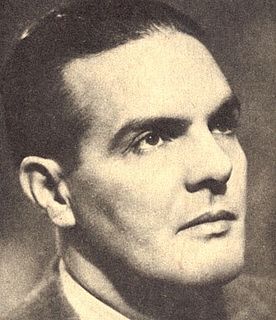
Gustavo Machado Morales was a Venezuelan politician and journalist, editor of the Communist Party of Venezuela's newspaper from 1948 to 1983 and President of the party from 1971 to 1983. As a leading Communist, he spent a substantial part of his life in exile or in prison. He was a founder member of the Venezuelan Revolutionary Party in February 1927, a forerunner of the Communist Party of Venezuela. He was a member of the Generation of 1928 - activists opposing the dictatorship of Juan Vicente Gómez. During the 1945-8 democratic period he was a member of the Constituent Assembly and a candidate in the 1947 presidential election for the Communist Party. He was elected to the Venezuelan Chamber of Deputies four times, serving there for fifteen years.

The Communist Party of Cuba is the ruling political party in the Republic of Cuba. It is a communist party of the Marxist–Leninist model. The Cuban constitution ascribes the role of the party to be the "leading force of society and of the state". Since April 2011, the First Secretary of the Central Committee has been Raúl Castro, younger brother of the previous First Secretary Fidel Castro, who died on 25 November 2016. The Second Secretary has been José Ramón Machado Ventura.
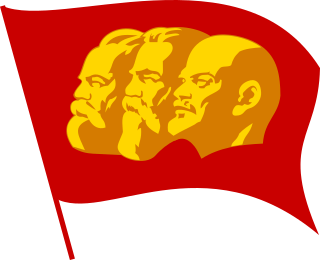
Hoxhaism is a variant of anti-revisionist Marxism–Leninism that developed in the late 1970s due to a split in the Maoist movement, appearing after the ideological dispute between the Communist Party of China and the Party of Labour of Albania in 1978. The ideology is named after Enver Hoxha, a notable Albanian communist leader.

The International Marxist Tendency (IMT) is an international Trotskyist tendency founded by Ted Grant and his followers following their break with the Committee for a Workers International in the early 1990s. Their website, Marxist.com, is edited by Alan Woods. The site is multilingual, and publishes international current affairs articles written from a Marxist perspective, as well as many historical and theoretical articles. The IMT is active in over 30 countries worldwide.













